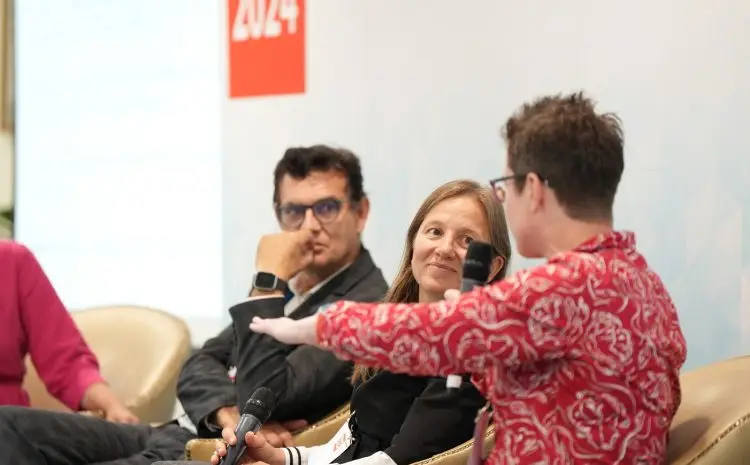Emerging technologies and innovation: the key to competing on the global stage

The Emerging Technologies and Innovationpanel discussion at RAID 2024
The RAID 2024 conference hosted a panel on “Emerging Technologies and Innovation,” featuring a diverse lineup of experts in innovation, AI, and research policy. The session focused on the current challenges and opportunities within Europe’s technology landscape and how the region can foster innovation to compete globally. The panellists included Isidro Laso Ballesteros, Cabinet Member for innovation and startups, Commissioner Vălean for Transport at the European Commission; Cécile Huet, Head of Unit A1 (Robotics and Artificial Intelligence Innovation and Excellence), DG Connect, European Commission; Prof. Charlotte Deane MBE, Executive Chair at the UK’s Engineering & Physical Sciences Research Council; and was moderated by Karen Boers, Managing Director of FARI, AI for the Common Good Institute.
Bridging the Innovation Gap
A key theme throughout the discussion was the gap between Europe’s technological potential and its global competitors, particularly in terms of entrepreneurial drive and investment. Laso Ballesteros highlighted a sense of urgency brought by Mario Draghi’s recent Report on the Future of European Competitiveness, illustrating how Europe’s global economic influence has diminished over the past three decades. He emphasised that despite an abundance of talent and resources, Europe struggles to harness these effectively, especially when compared to the United States and China.
“The talent is here. The money is here. We just need to find a way to better connect all of that.”
Isidro Laso Ballesteros
Boers echoed this sentiment, suggesting that Europe might be missing the bold ambition seen in other regions. The U.S. often encourages undergraduates to pursue entrepreneurship and “go big” from the start, whereas in Europe, a more conservative approach persists. Boers proposed that a cultural shift is needed to foster the ambition necessary to drive technological advancements.
The Role of Education and Culture in Innovation
Prof. Deane highlighted the cultural aspects that hinder entrepreneurship in Europe. She argued that the way Europe educates its future leaders – focusing on creating thought leaders rather than entrepreneurs – needs to be revisited. While European institutions excel at producing top-notch talent, they often lack the drive to create disruptive startups, particularly those that scale globally.
Deane emphasised the need to instil a mindset that encourages risk-taking and embraces failure as part of the innovation process. The panel agreed that nurturing this entrepreneurial spirit is crucial, and it would require more than just funding – it demands a fundamental change in how people perceive and approach innovation.
“We need thousands of people who want to start companies because many will fail, but it’s about fostering the ambition to keep going and innovate.”
Prof. Charlotte Deane MBE
Europe’s Strengths in AI and HPC
Cécile Huet presented a more optimistic view, citing Europe’s significant resources in high-performance computing (HPC) and its AI innovation capabilities. She stressed that while Europe may not have the same scale of investment as other global leaders, it does have unique strengths in its infrastructure. She highlighted the potential of Europe’s world-leading machines and advocated for the creation of ecosystems that connect AI developers with industry, thus fostering collaborative innovation.
Huet also pointed out the importance of utilising these HPC resources to train AI models, particularly in scientific applications, and emphasised the need to scale up these efforts for broader industrial use. Europe’s challenge, she said, is to ensure that these technological advantages are leveraged efficiently and that they become accessible to industries that can benefit from AI-driven solutions.
“We have fantastic hubs in Europe and unicorns are emerging. We need to build on that success and expand it.”
Cécile Huet
Public Procurement: A Key to Innovation
The panel also addressed the importance of public procurement in driving technological innovation. Boers noted that public sector engagement is a significant catalyst for tech ecosystems globally, pointing to Silicon Valley and Tel Aviv as examples where public administration plays a crucial role in adopting emerging technologies. However, in Europe, public sector adoption of technology often lags behind due to regulatory complexities and risk aversion.
Laso Ballesteros mentioned that despite existing regulations that support procurement from startups, cultural and bureaucratic barriers prevent these policies from being fully realised. He urged for more thought leadership to change this mindset, emphasising that public administrations should be leaders in innovation, not just bystanders.
Industrial Strategy and the Healthcare Sector
A question from the audience sparked a discussion on Europe’s industrial strategy, particularly in the healthcare sector. Panellists acknowledged the dominance of American giants in health tech and expressed concern that Europe risks falling further behind. Huet advocated for a more integrated strategy that links innovation directly to healthcare systems, enabling new technologies to be seamlessly adopted within clinical settings.
Collaboration and Ecosystems are Key
The overarching message from the panel was that Europe has the talent, resources, and infrastructure to lead in emerging technologies. However, realising this potential requires a more ambitious mindset, a stronger entrepreneurial culture, and better collaboration between public and private sectors. By building ecosystems that foster innovation and bridging the gap between research and industry, Europe can position itself as a leader in emerging technologies.
The panel concluded with a call to action: Europe must capitalise on its strengths and drive forward with bold initiatives in AI, robotics, and HPC to be competitive in the global tech landscape.




